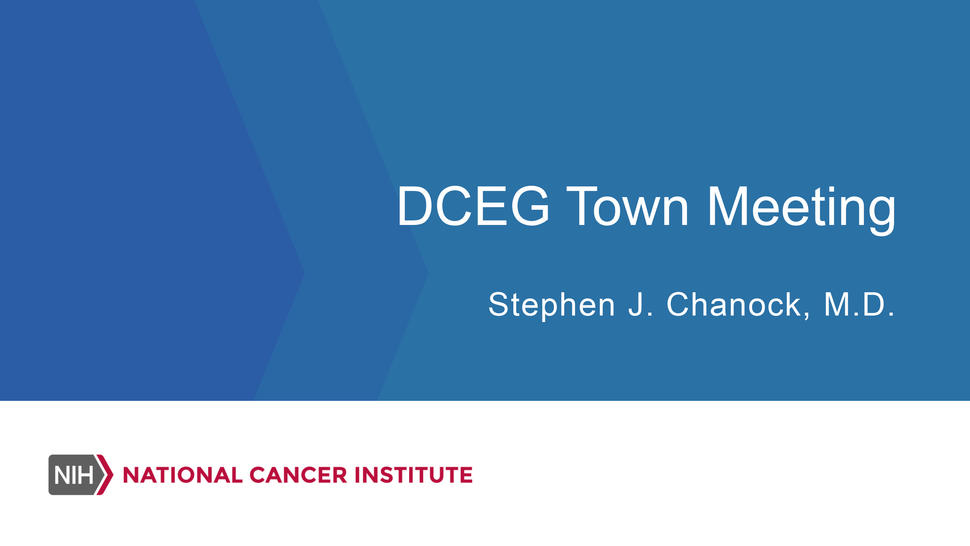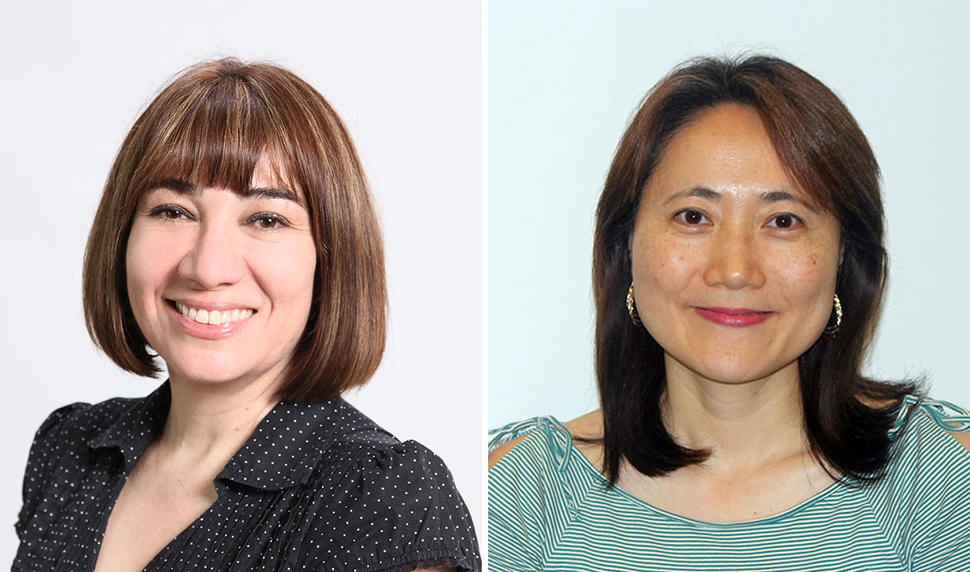DCEG Staff Gather in Virtual Town Hall Meetings, 2020 Summer and Fall
, by DCEG Staff
Over the last several months, DCEG Town Hall Meetings have evolved from biannual in-person gatherings to monthly virtual meetings to support and connect Division staff working from home during the COVID-19 pandemic. Director Stephen J. Chanock, M.D., discusses new developments in the Division, recognizes accomplishments over the past month, and shares photographs submitted by staff, showing virtual branch meetings and snapshots of work-at-home.
In October, Dr. Chanock announced the formation of the Trans-Divisional Research Program (TDRP), replacing the former Epidemiology and Biostatistics Program and the Human Genetics Program. The TDRP mission is to conduct and facilitate trans-divisional research on cancer epidemiology, genetics, and prevention across DCEG. The Program is expected to increase cross-branch research initiatives, data sharing and analytics capacity; its development evolved from the retirement of Program Directors Robert N. Hoover, M.D., Sc.D., scientist emeritus and Margaret A. Tucker, M.D., scientist emerita, who provided strategic leadership to DCEG for many decades.
During the Summer and Fall Town Hall Meetings, Dr. Chanock gave special tribute to staff who have made substantial contributions and service to the Division with the following awards.
Kelly Government Distinguished Achievement Awards
This award honors the significant contributions of a Kelly Government employee that improves the economy, efficiency, and effectiveness of an NIH Program or mission, or for the development of a new and useful process that provides specific value to the NIH. This year, 10 DCEG contractors were recognized:
Andrea Ayers
Outstanding contributions to three projects examining international incidence rates of cancer
Jessica Bayer
Excellence in support of the Clinical Genetics Branch human subjects research program, migration of all branch research projects into a new Institutional Review Board system, and preparation for the branch quadrennial scientific site visit
Ashley Geczik
Designing and implementing a strategic plan of action for the often over-looked complexities of a systematic review
Autumn Hullings
Going above and beyond her given assignments, taking initiative to complete projects, learning the difficult tasks associated with studying microbiome, and helping complete manuscripts
Hela Koka, M.P.H., M.S.
Playing a major role in organizing, maintaining, and analyzing datasets for the chordoma genomic study and several breast cancer related projects
Kaitlyn Mazzilli, M.P.H.
Leading a key project in which she identified many new candidate biomarkers for diet that could be used to supplement, or even replace, some of the self-report measures we typically use
Cara Murray
Exceptional contributions to streamlining onboarding of trainees across DCEG and creating a new orientation handbook for all DCEG hires
Adeola Obajemu
Significant contribution to the exploration of genetic risk factors for bladder cancer
Rui Zhang
Demonstrating an outstanding ability to perform high-level statistical and programming tasks for a project estimating the excess cancer cases caused by the Trinity nuclear test
Wei Zhao, Ph.D.
Integrative analyses of tumor genomic profiling and research on tumor microenvironment, which greatly contributed to the understanding of cancer etiology and progression
2021 NCI Director’s Innovation Awards
The NCI Director’s Intramural Innovation Award Program is designed to support development of highly innovative approaches and technology aimed at significant cancer–related problems. Novel proposals from either CCR or DCEG with the potential for high impact, the potential to generate new intellectual property or technology, an emphasis on health disparities research, or which are considered too high-risk or preliminary to pursue within the base budget allocation are encouraged. The program offers one-time awards for use in the next fiscal year. Seven DCEG scientists received the 2021 awards as listed below.
Principal Investigator Awards
Maria Constanza Camargo, Ph.D.
“Parasite serological profiling of patients with advanced gastric preneoplastic lesions.”
Jiyeon Choi, Ph.D.
“Single-cell eQTL profiling of normal lung in Asian never-smokers for functional characterization of lung cancer risk-associated genomic loci.”
Career Development Awards
Katelyn Connelly, Ph.D.
“Examining the interplay between PDAC risk loci and cellular stress responses.”
Monica D’Arcy, Ph.D.
“A network analysis approach to understanding never-smoking lung cancer risk factors.”
Jongeun Rhee, Sc.D.
“Serum levels of per- and polyfluoroalkyl substances (PFAS) and thyroid cancer risk in the Prostate, Lung, Colorectal and Ovarian Cancer Screening Trial.”
Minkyo Song, M.D., Ph.D.
“Autoantibody immunoproteomic microarray for cancer-associated autoimmune diseases.”
Rohit Thakur, Ph.D.
“Spatial fine mapping of ultraviolet radiation responsive melanoma susceptibility and pigmentation loci.”
DCEG Fellows Award for Research Excellence
DCEG Fellows Award for Research Excellence (D-FARE) provides funding for travel to scientific meetings or conferences to fellows who have made exceptional contributions to research projects. These contributions may include formulating research ideas, developing study designs, conducting fieldwork and analysis, or interpreting results. Each of the recognized fellows also must have played a major role in drafting a manuscript.
Eight winners were chosen by members of the ad hoc DCEG committee in July:
Rotana Alsaggaf, Ph.D.
“Epigenetic aging in hematopoietic stem cell transplantation is associated with poor outcomes in patients with severe aplastic anemia: Results from DNA-methylation GrimAge.”
* Eboneé Butler, Ph.D.
“Testosterone therapy in relation to cancer risks among men in the SEER-Medicare database.”
Justin Yongli Han, Ph.D.
“Statistical approaches using longitudinal biomarkers for disease early detection: A comparison of methodologies.”
Rebecca Landy, Ph.D.
“Could use of individualized risk models mitigate health disparities in eligibility for lung cancer screening?”
Zhiwei Liu, Ph.D.
“Prospective nasopharyngeal carcinoma risk prediction model for a population undergoing screening.”
Leatrisse Oba, M.D.
“Clinical blood tests and cancer surveillance in Li-Fraumeni syndrome.”
* Cody Ramin, Ph.D.
“Treatment-associated endocrine symptoms and change in ultrasound tomography measures of breast density after tamoxifen therapy.”
Zeni Wu, Ph.D.
“Cigarette smoking and opium use in relation to the oral microbiota in Iran.”
(*Award funded by Cancer Prevention Fellowship Program)
Nine winners were chosen by members of the ad hoc DCEG committee in October:
Mustapha Abubakar, M.D., Ph.D.
“Prognostic value of machine learning-based stromal cellular density as a quantitative proxy for inflammation and wound repair in breast cancer.”
Rouf Banday, Ph.D.
“Increased dACE2 expression in squamous tumors is unlikely to elevate the risk of SARSCoV-2 infection.”
Derek Brown, Ph.D.
“Genetically predicted telomere length is associated with clonal somatic copy number alterations in peripheral leukocytes.”
Ian Buller, Ph.D.
“Geographic variation in the oral microbiome of NIH-AARP Diet and Health Study participants.”
Sarah Irvin, M.S.
“Integrated analysis of inflammation-related exposures in ovarian cancer histotypes in the ovarian cancer association consortium (OCAC).”
Jung Kim, Ph.D.
“Increase in false discovery rate in rare-variant analyses using publicly available sequence resources.”
Jessica Madrigal, Ph.D.
“Residential exposure to carbamate, organophosphate, and pyrethroid insecticides in house dust and risk of childhood acute lymphoblastic leukemia.”
Kara Michels, Ph.D.
“Circulating markers of amino acid metabolism and endometrial cancer risk in the Prostate, Lung, Colorectal, and Ovarian Cancer Screening Trial (PLCO).”
Lingxiao Wang, M.S.
“An efficient and robust propensity-score based matching method for improving external validity of epidemiologic cohort analyses.”




